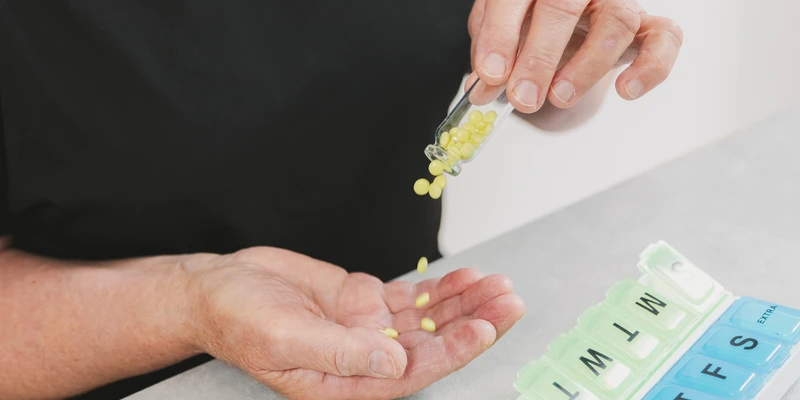
Table of Contents
- Long-Term Help for Adderall Recovery in LA
- Outpatient Programs for Adderall Relapse Care
- Warning Signs of Potential Adderall Relapse
- Daily Habits That Help Prevent Relapse
- Coping With Triggers in a Busy LA Lifestyle
- Using CBT to Prevent Adderall Relapse
- Staying Motivated in Recovery with MI
- Sober Living for Lasting Adderall Recovery in LA
- Managing ADHD Post-Rehab to Prevent Adderall Use
- Inclusive Adderall Aftercare for LGBTQ+ in LA
- Relapse Prevention for Teens Recovering from Adderall
- Mental Health Support to Avoid Adderall Relapse
- Connect With Adderall Relapse Resources Near You

Staying on the path to recovery from Adderall misuse can be especially challenging in a fast-paced city like Los Angeles. The intense demands of careers in entertainment, tech, and other high-performance industries often increase pressure to stay alert and productive. These environmental and social stressors, combined with lingering symptoms from early recovery—such as fatigue or poor focus due to Adderall withdrawal—can raise relapse risks without proper support.
Urban living also brings a higher exposure to relapse triggers, such as access to prescription stimulants, nightlife scenes, and an underlying culture of hustle that can make rest feel unproductive. That’s why proactive trigger management and personalized relapse prevention strategies are essential. Addiction recovery isn’t one-size-fits-all, and relapsing doesn’t mean failure—but understanding the unique pressures of life in LA can help you build a recovery plan that holds up.
A sustainable recovery journey should include long-term tools for managing stress and rebalancing brain chemistry, ideally with input from medical professionals who understand both substance use and local lifestyle dynamics.
Long-Term Help for Adderall Recovery in LA
Recovering from Adderall misuse takes more than short-term detox or inpatient care—it’s a journey that continues long after initial treatment. In Los Angeles, many rehab centers offer structured aftercare programs that prioritize long-term stability. These services may include outpatient counseling, sober living options, peer support groups, and relapse prevention planning. Sustained engagement in these programs can reduce relapse risk and support healthy lifestyle rebuilding.
Adderall Rehab Options in LA include continuity of care through structured services. Individuals transitioning out of primary Adderall rehab may benefit from step-down models of support, such as intensive outpatient programs (IOP) or alumni services. These options help maintain community connections and promote accountability during vulnerable phases of recovery. Aftercare in LA often includes personalized treatment plans tailored to evolving mental health and behavioral needs, further reinforcing resilience.
By committing to long-term recovery pathways and accessing comprehensive aftercare, people recovering from Adderall dependence can build more sustainable, balanced lives in the context of their community. Surrounding yourself with layered support increases the chance of maintaining sobriety long term.
Outpatient Programs for Adderall Relapse Care
For many Angelenos seeking sustainable Adderall relapse prevention, outpatient programs offer a flexible and empowering path forward. Unlike inpatient programs, outpatient treatment allows you to maintain responsibilities—like work, school, or family care—while continuing to receive structured support. These programs are especially valuable during the vulnerable period after detox or residential care, helping you apply recovery tools in real-world environments without losing access to professional guidance.
Outpatient care in Los Angeles typically combines individual counseling, group therapy, and medication management where appropriate. They also address co-occurring needs such as ADHD and substance misuse or underlying mental health symptoms. Since triggers can appear quickly during reentry into everyday life, outpatient care often emphasizes relapse warning signs, trigger management techniques, and peer support through accountability partners or group sessions. Local programs tend to tap into the LA recovery community, promoting connection and continuity as you build a lasting foundation for sobriety.

Warning Signs of Potential Adderall Relapse
Knowing the early warning signs of a potential Adderall relapse can help you—or someone you care about—take timely action. These signs often appear before a full return to use and usually emerge as subtle shifts in thoughts, feelings, or behaviors.
Common relapse warning signs may include romanticizing past Adderall use, increased secrecy, skipping recovery meetings, or a return to old social circles that supported drug use. Emotional red flags like irritability, anxiety, or depression may also intensify. Mental stressors—like feeling overwhelmed or hopeless—can further erode your recovery mindset.
Behavioral changes, such as poor sleep, impulsive decisions, or avoiding support systems, are often precursors to relapse. In Los Angeles, where a fast-paced lifestyle can magnify pressure, it’s essential to stay grounded in your support network and reach out when patterns start to shift.
Daily Habits That Help Prevent Relapse
Establishing supportive daily routines is one of the most effective ways to fortify your Adderall relapse prevention efforts in Los Angeles. Consistent structure, paired with intentional healthy habits, helps build momentum in recovery while reducing decision fatigue and impulsivity.
Helpful daily practices include waking up at the same time each morning, planning meals and movement, and taking time to wind down in the evenings. Incorporating mindfulness practices, such as journaling or brief meditation, can help regulate emotions and reduce stress. These routines not only support stability but also create space for reflection and growth.
Working with accountability partners—whether through peer support groups, sober coaches, or a trusted friend—adds another layer of reinforcement. Staying connected and talking through obstacles can help build resilience against cravings or isolation.
Finally, keep a toolbox of practical coping strategies updated and accessible. Whether it’s reaching out to a support person or using techniques learned in therapy, having go-to responses can prevent relapse when stress hits unexpectedly.

Coping With Triggers in a Busy LA Lifestyle
Life in Los Angeles can be exhilarating, but that fast-paced, high-pressure environment can also create unique challenges for maintaining sobriety after Adderall use. Crowded commutes, demanding careers, and constant social stimulation may aggravate stress or trigger cravings. The risk of relapse increases when recovery coping strategies aren’t tailored to this urban backdrop.
To manage triggers effectively, identify your high-risk environments, whether it’s late work hours in the entertainment industry or peer pressure in nightlife circles. Practicing mindfulness during traffic, setting boundaries on social and digital stimuli, and scheduling regular check-ins with accountability partners can help maintain emotional balance. For those navigating both ADHD and substance misuse, making space for self-regulation—especially during LA’s busy weekdays—is critical.
Incorporating local support, such as peer groups and aftercare programs within the broader LA recovery community, can offer structure and encouragement. Resilience in relapse prevention often depends on adapting coping tools to fit real-life rhythms, including the unique pressures found across Los Angeles.
Using CBT to Prevent Adderall Relapse
Cognitive Behavioral Therapy (CBT) is one of the most effective approaches for Adderall relapse prevention in Los Angeles. CBT helps you understand and change the thought patterns that contribute to substance misuse. By identifying negative beliefs and reframing self-defeating behaviors, people in recovery can build resilience and respond more effectively to cravings or stress.
In a city like LA—where fast-paced routines and external pressures are common—behavioral therapy in Los Angeles equips you with long-term coping strategies essential for daily life. It also enhances your emotional regulation, supports trigger management, and promotes mindfulness during recovery. Regular CBT sessions can help reduce the risk of relapse by pairing practical tools with an understanding of mental health challenges like ADHD and other co-occurring disorders. With practice, CBT becomes a foundation for sustainable self-awareness and change.

Staying Motivated in Recovery with MI
Staying committed to long-term Adderall relapse prevention in Los Angeles often depends on how you stay emotionally and mentally engaged in your recovery journey. Using MI for Motivation is a collaborative, client-centered therapy that helps you realign your goals and resolve ambivalence about staying sober. It’s especially useful when motivation wanes or you begin questioning your progress.
MI empowers you to explore your personal reasons for change while reinforcing self-efficacy—a key protective factor against relapse. Rather than prescribing a path, it guides you in identifying the values and desires that make recovery meaningful to you. In a city like LA, with its constant pressures and distractions, MI can help ground your intentions and keep you moving toward lasting change with clarity and purpose.
Sober Living for Lasting Adderall Recovery in LA
Sober living homes offer a vital bridge between inpatient rehab and full independence, especially for those navigating Adderall relapse prevention in Los Angeles. These structured environments support the development of healthy routines, accountability, and social connection—key pillars of long-term recovery.
In a city as dynamic and fast-paced as LA, sober living can be an anchor, providing stability while you rebuild your life. Residents often attend outpatient therapy, continue with group meetings, and participate in household responsibilities, all within a drug-free, community-focused setting. Explore LA sober living with options across Los Angeles, from Echo Park to the San Fernando Valley, where homes cater to diverse needs and backgrounds, helping individuals build sustainable habits in real-world conditions.

Managing ADHD Post-Rehab to Prevent Adderall Use
Undiagnosed or poorly managed ADHD can be a key factor in recurring Adderall use, particularly in people with a dual diagnosis. Without adequate support for concentration difficulties, impulsivity, or mood regulation, individuals may be drawn back to stimulant use for temporary relief. Post-rehab care should therefore address ADHD as a clinical condition, not just a behavioral concern.
In Los Angeles, many aftercare plans integrate dual diagnosis ADHD support, allowing for both substance use recovery and mental health treatment. Holistic ADHD management may involve non-stimulant medications, cognitive behavioral therapy, mindfulness techniques, and skills-based coaching. When these approaches are customized to each person’s neurodiverse needs, they can significantly reduce relapse risk and support long-term wellness.
Inclusive Adderall Aftercare for LGBTQ+ in LA
For LGBTQ+ individuals in Los Angeles, Adderall relapse prevention requires more than standard relapse plans—it demands aftercare tailored to identity and lived experience. Anxiety around discrimination, stigma, or exclusion can increase relapse risk, particularly after formal treatment ends. That’s why identity-affirming aftercare support that respects gender and sexual diversity are an essential part of sustainable healing.
LGBTQ+-inclusive aftercare may offer group therapy focused on shared experiences, sober spaces that prioritize psychological safety, and providers trained in navigating the intersection of ADHD and substance misuse among queer populations. These resources not only support psychological wellbeing, but also reinforce belonging within the LA recovery community. Choosing a recovery path that honors who you are can strengthen commitment, reduce isolation, and build lasting resilience after Adderall withdrawal management or inpatient care concludes.

Relapse Prevention for Teens Recovering from Adderall
Teens face unique challenges when recovering from Adderall misuse, including academic pressures, developing brains, and peer influence. Relapse prevention for adolescents requires an age-appropriate, family-inclusive framework that centers emotional maturity, education support, and ongoing mental health care.
Successful teen relapse prevention often includes structured aftercare programs that incorporate school reintegration, routine therapy, and early intervention for co-occurring issues such as anxiety or ADHD. Parent or caregiver involvement plays a critical role—not only as accountability partners but also in reinforcing coping strategies and setting healthy boundaries at home. Los Angeles offers adolescent-specific resources to support the long-term recovery of teens, helping them develop resilience without returning to stimulant use. Find Rehab for Adolescents to ensure access to tailored care and the support needed for sustained recovery. Maintaining open, stigma-free communication within families supports both relapse prevention and emotional growth.
Mental Health Support to Avoid Adderall Relapse
Mental health plays a central role in Adderall relapse prevention, especially in Los Angeles where high stress and overstimulation can complicate recovery. Conditions like anxiety, depression, and ADHD often co-occur with stimulant misuse, increasing the risk of relapse when left untreated. This dual diagnosis dynamic means both mental illness and substance use need to be addressed in tandem.
Support for Dual Diagnosis in LA is essential to achieving meaningful recovery. Access to integrated care—such as therapy, medication management, and trauma-informed support—can make a meaningful difference in maintaining sobriety. Therapeutic strategies like cognitive behavioral therapy (CBT) and psychiatric monitoring help build emotional resilience and safeguard recovery progress. If you’re navigating both mental health challenges and substance use recovery, you’re not alone—and specialized dual diagnosis support can offer a more sustainable path forward.

Connect With Adderall Relapse Resources Near You
Continuing support is key to maintaining long-term recovery from Adderall misuse, especially in a fast-paced place like Los Angeles. Whether you’re seeking accountability partners, flexible aftercare programs, or a sober community that understands your journey, the LA recovery community offers diverse resources to help you stay on track.
If you’re ready to take the next step or recommit to your path, there are local centers and professionals equipped to provide compassionate, nonjudgmental care. Find a place where relapse prevention is backed by lived experience, structure, and connection.
Frequently Asked Questions
What are common triggers for Adderall relapse?
Common triggers for Adderall relapse often include high-stress environments, unresolved trauma, co-occurring mental health conditions like anxiety or depression, and exposure to peers still using stimulants. Lack of structure, sleep disturbances, and overworking—especially common in fast-paced cities like Los Angeles—can also increase vulnerability.
Are there relapse prevention programs in Los Angeles?
Yes, many treatment centers in Los Angeles offer structured relapse prevention programs tailored to stimulant recovery. These programs often combine individualized therapy, support groups, skills training, and monitoring to help clients develop sustainable recovery strategies. Some also provide specialized tracks for dual diagnosis or LGBTQ+ clients.
Does outpatient rehab help prevent Adderall relapse?
Outpatient rehab can be highly effective in preventing relapse, especially for those transitioning from inpatient care or managing ongoing responsibilities like work or school. Regular therapy, group support, and medication oversight in an outpatient setting help reinforce healthy behaviors without full-time residential care.
What coping skills reduce the risk of relapse?
Building a toolkit of coping strategies is essential for sustained recovery. Helpful techniques include:
Can sober living homes support Adderall recovery?
Sober living homes in Los Angeles provide a structured, drug-free environment that reinforces recovery goals. These homes offer accountability, peer support, and connection to local resources while allowing residents to gradually reintegrate into daily life.
How does CBT help with relapse prevention?
Cognitive Behavioral Therapy (CBT) helps individuals recognize and change thought patterns that lead to cravings or unhealthy behaviors. It teaches practical skills such as managing stress, problem-solving, and reframing negative beliefs—crucial tools during Adderall recovery.
How long should Adderall aftercare last?
There’s no one-size-fits-all answer, but most recovery specialists recommend aftercare for at least 6 to 12 months post-rehab. Ongoing support helps address lifestyle changes, rebuild relationships, and maintain progress through therapy, group sessions, or continuing care plans.
What role does ADHD treatment play after rehab?
Treating underlying ADHD is vital to reduce the risk of relapse. Non-stimulant medications, behavioral therapy, and structured routines can help manage symptoms without returning to Adderall use. Proper ADHD management supports emotional regulation and better decision-making.
Are relapse plans personalized in LA programs?
Most rehab and aftercare programs in Los Angeles tailor relapse prevention plans based on each person’s risk factors, history, and unique life circumstances. These individualized plans often include therapy, peer support, and specific response strategies for high-risk situations.
How can I support a loved one after rehab?
Providing consistent emotional support, encouraging their involvement in recovery groups, and helping them maintain a healthy routine can make a big difference. Learning more about Adderall addiction and attending family therapy can also strengthen trust and improve understanding.








































